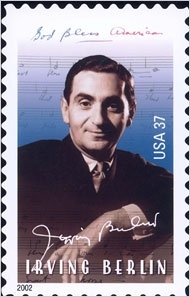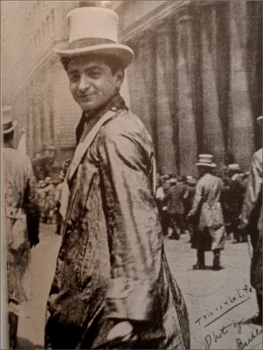In heaven over Irving Berlin music
We own more phonographs than there are old record stores in Israel. We have two and there's only one. Located in Tel Aviv near Dizengoff Center, it's called "Chor Beshachor", which means a hole in the black, referring to the old-fashioned vinyl records which have a hole in their center.
I go to the old record store about once a month. There are always "new" old records for sale as people are constantly cleaning out their homes. I'm in heaven whenever I find an old record of Irving Berlin songs.
Irving Berlin is considered by many to be America's greatest song writer. Jerome Kern, the famous composer and lyricist, said of Irving Berlin: "He has no place in America's music – he is America's music."
Irving Berlin wrote four iconic American songs: God Bless America, White Christmas, Easter Parade and There's No Business Like Show Business, as well as another 1,496 that are also very good.
There is no way that one can describe his genius in a short essay, but the words optimistic, wholesome, sentimental, patriotic, funny, and wise come to mind. I know the lyrics of very few songs by heart, but I do know "Count Your Blessings":
When you're worried
And you can't sleep,
Count your blessings
Instead of sheep
And you'll fall asleep
Counting your blessings
Irving Berlin was born in Russia in 1888. His family immigrated to America when he was five years old. When Irving was thirteen, his father died and he had to drop out of school to help support his family. That was the end of his formal education. He began by hawking newspapers, then singing while hawking, then singing in saloons for coins, and finally, becoming a singing waiter. In 1911, he had his first hit song: Alexander's Ragtime Band.
He was a highly promising song writer when he married Dorothy Goetz in 1912. Tragically, his young wife died of typhoid fever, contracted on their honeymoon in Cuba, during the first year of their marriage. He entered a blue period and it was years until he emerged from it.
In 1925, he fell in love a second time. His second wife was Ellin Mackay. He wrote this song during that happy period in his life:
I'll be loving you always
With a love that's true always …
Days may not be fair, always
That's when I'll be there, always
Not for just an hour
Not for just a day
Not for just a year
But always
After his first daughter was born, he wrote:
Blue skies smiling at me
Nothing but blue skies do I see …
Blue days all of them gone
Nothing but blue skies from now on.
Irving Berlin's songs sound deceptively simple – as if they were written in a minute. The opposite is true. His daughter once described her father as a workaholic who often stayed up until 4 or 5 o'clock in the morning, trying to find just the right word, just the right melody. He "sweated blood over his songs," she said. This is an example of what emerged from all that toil:
Heaven
I'm in heaven
And my heart beats so
That I can hardly speak
And I seem to find the happiness I seek
When we're out together
Dancing cheek to cheek
The Berlins became extremely rich and extremely generous. In 1954, Berlin was awarded the Congressional Gold Medal, and in 1977, the Presidential Medal of Freedom. George Gershwin said, "I frankly believe that Irving Berlin is the greatest songwriter that has ever lived…. His songs are exquisite cameos of perfection."
Irving Berlin lived to be 101 years old. He knew great sorrow and great joy in his personal life and also in the life of his country. He lived through two world wars and the Great Depression. As the musical voice of his generation, he always seemed to find the right words to buoy up a people in troubled times. In 1932, during the depression, he wrote:
Mister Herbert Hoover
Says that now's the time to buy
So let's have another cup of coffee
Let's have another piece of pie
Today, the public overwhelmingly buys music on discs or online. What happens to the music that was recorded for so many years on vinyl? Most of that music is simply lost, never to be rerecorded for future generations. Irving Berlin is one of the very few songwriters whose music will be sung by new artists in the generations to come, but even most of his songs that were recorded in the past will disappear, never to be heard again. That's why, when I find a new-old record of Irving Berlin's songs, "I'm in heaven".










Comments